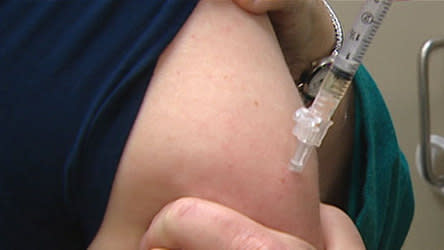 Daily Brew
Daily BrewB.C. measles outbreak spreads into U.S. as health advocates call for national vaccination registry

It isn't enough that some are risking the health of other Canadians by refusing to vaccinate their kids against measles; now we're exporting the problem.
The Canadian Press reports a U.S. health officer has confirmed an American living across the border from Abbotsford, B.C., contracted the disease while on a B.C. visit.
The Fraser Health Authority declared an outbreak of measles earlier this month following a cluster of cases centred around an Abbotsford Christian school. As of last week, there were 228 confirmed cases, including a student who attends a post-secondary institution in the Vancouver suburb of Burnaby.
Health officials blamed the outbreak on low rates of immunization among children from religious communities and schools.
[ Related: Measles outbreak in east Fraser Valley prompts warning ]
The Washington state resident who contracted the disease is isolated at home, Greg Stern of the Whatcom County Health Department told CP. It was not revealed whether the patient was an adult or child.
Health authorities in Hamilton, Ont., are also trying to trace locations and people a local resident may have had contact with after the adult tested positive for the highly contagious measles virus, the Huffington Post reports.
The Post noted that besides the B.C. outbreak, cases have been reported in Calgary, Ottawa and Saskatchewan, as well as New York City and Boston.
Although three of the four Calgary patients had received measles vaccinations, officials say low immunization rates in some areas are an issue.
"It's in those pockets of unimmunized or under-immunized kids where measles can, because it's such an infectious disease . . . get into those populations," Dr. John Spika, director general of the centre for immunization and respiratory infectious diseases at the Public Health Agency of Canada, told CBC News last week.
These pockets, among an estimated 95-per-cent vaccination rate for measles nationwide, keep the threat of outbreaks alive. Fraser Health said immunization rates in the eastern Fraser Valley, which includes Abbotsford, are between 60 and 70 per cent.
"We're also seeing with immigration, people coming from countries where vaccine-preventable diseases are occurring, and that also challenges our protection," added Dr. Kumanan Wilson, a public-health policy researcher at Ottawa Hospital Research Institute.
[ Related: B.C. measles outbreak highlighs battle over vaccination holdouts ]
People who come down with measles risk a number of complications, including blindness and sometimes death due to a brain-swelling infection. Measles is one of the leading causes of death among malnourished children in the developing world, according to the World Health Organization.
Advocates say the problem of spotty vaccination rates points to the need of a national vaccine registry to augment provincial databases, the Globe and Mail reported Monday.
Such a registry would help track Canadians, as well as recent immigrants and those who've travelled to countries considered hotspots for contagious diseases.
"Here in Ottawa, we have a provincial data base [that tracks who has been immunized and when]," Dr. Rosamund Lewis, associate medical officer of health for Ottawa Public Health, told the Globe. "It's very useful and a big step in the right direction, [but] we need a national registry."
Advocates of a national registry say it would streamline contact between provincial and federal health bodies, ensure doctors have access to medical histories and allow people who don't have complete vaccination protection to be identified quickly, the Globe said.
"Health care is meant to be portable," Lewis said. "When we move from province to province, we don't necessarily carry our medical records with us."
Dr. Allison McGeer likes the idea of a national registry, given the fact it's easy for us to lose track of our vaccination records over decades. Most people can't remember when they were vaccinated as kids, or what for.
"Mothers sometimes forget, and family physicians move and retire, and their records are not kept forever," the University of Toronto infectious disease expert told the Globe.
"So when people end up being exposed to, say, measles, and need to know whether or not they are immune, it can be difficult to find out."
But McGeer said a national registry also raises privacy concerns.
"Setting up a system in which vaccine providers can enter vaccine data when you need them to, but not access information that is private to you, and have the information protected from hackers, has been a challenge that has so far defeated us in Canada," she said.
People need two doses of the vaccine — which provides coverage for measles, mumps and rubella — to be considered fully protected, the Globe noted.


